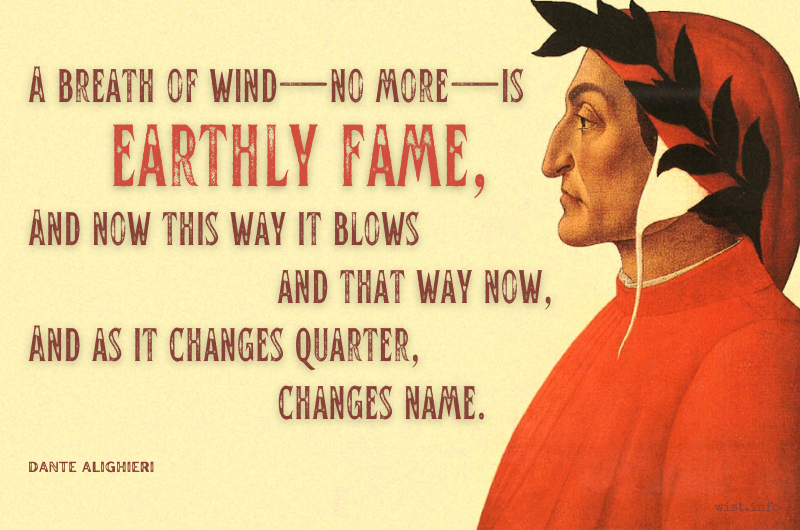A breath of wind — no more — is earthly fame,
And now this way it blows and that way now,
And as it changes quarter, changes name.
[Non è il mondan romore altro ch’un fiato
di vento, ch’or vien quinci e or vien quindi,
e muta nome perché muta lato.]Dante Alighieri (1265-1321) Italian poet
The Divine Comedy [Divina Commedia], Book 2 “Purgatorio,” Canto 11, l. 100ff (11.100-102) [Oderisi of Gubbio] (1314) [tr. Sayers (1955)]
(Source)
(Source (Italian)). Alternate translations:The breath of Fame is but a fickle gale,
Whose veering blasts from every point prevail,
And every change bestows a different name.
[tr. Boyd (1802), st. 20]The noise
Of worldly fame is but a blast of wind,
That blows from divers points, and shifts its name
Shifting the point it blows from.
[tr. Cary (1814)]The mundane rumour is a fleeting breath
Of wind, that veers and varies in account,
And changes name because it changes point.
[tr. Bannerman (1850)]Naught is this mundane rumour but a breath
Of wind, that comes now this way and now that,
And changes name, because it changes side.
[tr. Longfellow (1867)]The rumour of the world is naught else than a breath of wind, which now comes hence and now comes thence, and changes name because it changes quarter.
[tr. Butler (1885)]Mundane renown is but a breath forlorn
Of wind that cometh now from here, now there,
Named various from the quarter whence 'tis borne.
[tr. Minchin (1885)]Worldly renown is naught but a breath of wind, which now comes this way and now comes that, and changes name because it changes quarter.
[tr. Norton (1892)]Earthly fame is naught but a breath of wind, which now cometh hence and now thence, and changes name because it changes direction.
[tr. Okey (1901)]The world's noise is but a breath of wind which comes now this way and now that and changes name because it changes quarter.
[tr. Sinclair (1939)]Naught but a wind's breath is the world's acclaim,
Which blows now hence, now thence, as it may hap,
And when it changes quarter changes name.
[tr. Binyon (1943)]A breath of wind is all there is to fame
here upon earth: it blows this way and that
and when it changes quarter it changes name.
[tr. Ciardi (1961)]Earthly fame is naught but a breath of wind,
which now comes hence and now comes thence,
changing its name because it changes quarter.
[tr. Singleton (1973)]Your earthly fame is but a gust of wind
that blows about, shifting this way and that,
and as it changes quarter, changes name.
[tr. Musa (1981)]Earthly fame is nothing but a breath of wind,
Which first blows one way and then blows another,
And brings a fresh name from each fresh direction.
[tr. Sisson (1981)]Worldly renown is nothing other than
a breath of wind that blows now here, now there,
and changes name when it has changed its course.
[tr. Mandelbaum (1982)]The clamor of the world is nothing but a breath of wind that comes now from here and now from there, and changes names because it changes directions.
[tr. Durling (2003)]Worldly Fame is nothing but a breath of wind, that now blows here, and now there, and changes name as it changes direction.
[tr. Kline (2002)]The roar of earthly fame is just a breath
of wind, blowing from here and then from there,
that changes name in changing origin.
[tr. Kirkpatrick (2007)]Worldly fame is nothing but a gust of wind,
first blowing from one quarter, then another,
changing name with every new direction.
[tr. Hollander/Hollander (2007)]Shouts of worldly fame are nothing more
Than a passing breath of wind, blowing here,
Then there, changing its name from place to place.
[tr. Raffel (2010)]
Quotations about:
acclaim
Note not all quotations have been tagged, so Search may find additional quotes on this topic.
Land, gold, and trifles many give or lend,
But he that stoops in fame is a rare friend.[Aurum et opes et rura frequens donabit amicus:
Qui velit ingenio cedere, rarus erit.]Martial (AD c.39-c.103) Spanish Roman poet, satirist, epigrammatist [Marcus Valerius Martialis]
Epigrams [Epigrammata], Book 8, epigram 18 (8.18.9-10) (AD 94) [tr. Taylor (1657)]
(Source)
To a friend whom Martial considered as good or better an writer, who in turn publicly lauded Martial as the superior.
"To Cirinius." (Source (Latin)). Alternate translations:Friends oft to friends in other points submit;
Few yield the glory of the field in wit.
[tr. Hay (1755)]A friend will oft bestow gold, goods, or ground:
But who his wit will yield, is rarely found.
[tr. Elphinston (1782); Book 2, ep. 103]It is not uncommon for one friend to bestow on another good and land, but to make concessions of literary pre-eminence is a rare proof of friendship.
[tr. Amos (1858)]Gold, and wealth, and estates, many a friend will bestow; one who consents to yield the palm in genius, is rare.
[tr. Bohn's Classical (1859)]Gold and possessions and lands many a friend will bestow: he who is willing to yield in genius will be rare.
[tr. Ker (1919)]Full many a friend will give you wealth and fields;
But rare is he who thus in genius yields.
[tr. Pott & Wright (1921)]Gold, wealth, estates will many a man resign
To save a friend, but few the bay divine.
[tr. Francis & Tatum (1924), #400]Many a friend will give gold and riches and land, but one prepared to yield in talent will be found but seldom.
[tr. Shackleton Bailey (1993)]Some friends will give up goods or yield their gold.
But few will let their own worth go untold.
[tr. Wills (2007)]A friend will often give gold, wealth, and ground:
one who will yield in talent's rarely found.
[tr. McLean (2014)]
Not in the clamor of the crowded street,
Not in the shouts and plaudits of the throng,
But in ourselves, are triumph and defeat.Henry Wadsworth Longfellow (1807-1882) American poet
“The Poets,” Atlantic Monthly (Jul 1878)
(Source)
Fortune has dealt with me rather too well. I have known little struggle, not much poverty, many generosities. Now and then I have, for my books or myself, been somewhat warmly denounced — there was one good pastor in California who upon reading my Elmer Gantry desired to lead a mob and lynch me, while another holy man in the state of Maine wondered if there was no respectable and righteous way of putting me in jail. And, much harder to endure than any raging condemnation, a certain number of old acquaintances among journalists, what in the galloping American slang we call the “I Knew Him When Club,” have scribbled that since they know me personally, therefore I must be a rather low sort of fellow and certainly no writer. But if I have now and then received such cheering brickbats, still I, who have heaved a good many bricks myself, would be fatuous not to expect a fair number in return.
Neither human applause nor human censure is to be taken as the test of truth. He who should satisfy himself either with being popular, or with being unpopular, would equally be taking man’s judgment for his standard. But either the one or the other should set us upon careful self-examination.
Richard Whately (1787-1863) English logician, theologian, archbishop
Sermon, Christ Church, Dublin (22 Oct 1837)
(Source)
It is harder to avoid censure than to gain applause; for this may be done by one great or wise action in an age. But to escape censure a man must pass his whole life without saying or doing one ill or foolish thing.
David Hume (1711-1776) Scottish philosopher, economist, historian, empiricist
(Attributed)
(Source)
Quoted in The Home Circle (Jan 1855)
Popularity is a Crime from the Moment it is sought; it is only a Virtue where Men have it whether they will or no.
George Savile, Marquis of Halifax (1633-1695) English politician and essayist
“Of Ambition,” Political, Moral, and Miscellaneous Reflections (1750)
(Source)
When most the world applauds you, most beware;
‘Tis often less a blessing than a snare.











